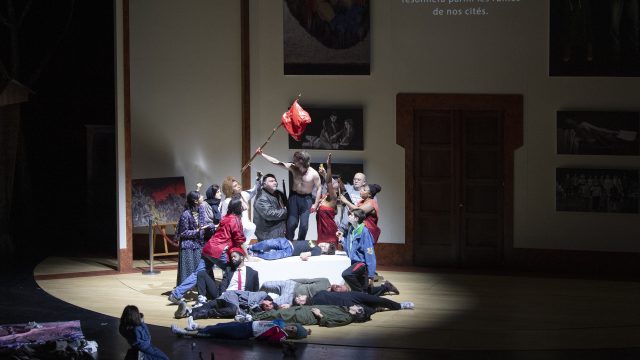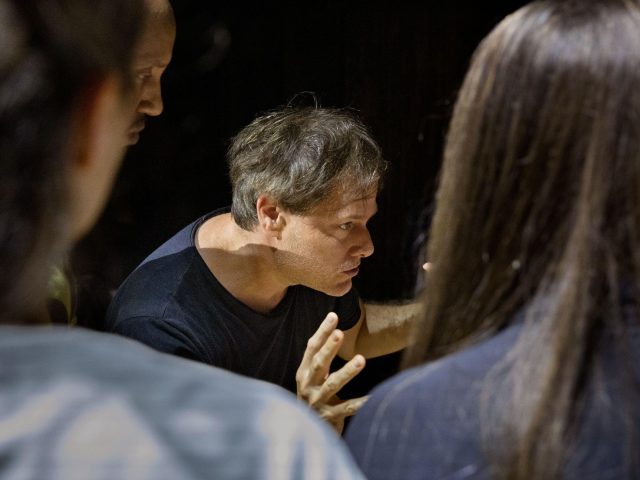'I wanted to take the work out of its operatic utopia and make it real again, to get reality back into art. That is the task of the artist, that is how art can change the world.'
Milo Rau
Artists tend to dramatize and aestheticize violent reality in their work, so that the authenticity of that reality is weakened and kept at bay. In La clemenza di Tito the same thing happens: the opera tells the story of power games among the elite that can lead to coups d'état, while the citizens of Rome suffer under the violence and their city burns. Translate that to Mozart's time and you get a story that, through the tolerance of the enlightened Titus, domesticates and aestheticizes the violent French Revolution. In my staging I investigate how this phenomenon occurs today and add a meta-critical layer by connecting the utopian and the real world. On the one hand, you see a museum on stage, the utopian and aestheticized space of the ruling elite. On the other hand, I show the real space of the subject in the form of a refugee camp. Not actors, but people who are stranded in the real world around the opera house in search of a better future, populate the place.
The addition of that actual space destroys the safe space of Titus and his elite friends. In this way, La clemenza di Tito becomes a form of self-criticism by the engaged artist: As a maker, am I not a bit of a Titus myself, a blowhard who depicts the cold world in a comfortable space, aestheticizes it and also lives off it? I therefore regard my version of Mozart's opera as a manifesto. I see the deconstructive thought process I have gone through as the way to go for dealing with operas and creating space for polyphony. We must rise to the challenge of connecting opera – the art form par excellence for utopian lies – with reality. By making cuts in the music and adjusting the text, for example. Or by giving non-professionals, in this case refugees, a place alongside professional singers and musicians. The manifesto I drew up for NTGent seems to fit in better with the opera genre than I originally thought, but that has drastic consequences for the final product: my Clemenza is anything but in keeping with the operatic tradition as we know it.
Post-opera?
In puncturing the opera utopia and disassembling Mozart's work, many opera connoisseurs and critics experience my La clemenza di Tito as destructive. They regard my staging as the end of the opera, a post-opera that disrespectfully transgresses the rules of the genre. However, compared to what I do in the theatre, I have held back out of respect for the music, the singers and the musicians. During the rehearsal process, they made me discover a new logic behind training and professionalism in the performing arts. Just as top football players rise from the favelas, the daughter of a cleaning lady can emerge as a top singer, due to the great attention for talent within the opera world. On and around an opera stage, there springs up a collection of people with talent and passion, who took years to develop their expertise, a fresh form of collectivity that is simply a prerequisite to arrive at an end product and one which I can only admire. For example, I can't read music at all, but there are plenty of others present who are happy to respectfully help me there.
The openness to everyone's talent touched me and led to a reconciliation with the gentility of professionalism, the opera audience and the genre itself. Working on La clemenza di Tito made me fall in love with opera. The rapid and systematic method of working that forces you as a maker to reflect in advance, appeals to me enormously. The collectivity around an opera production is heartwarming. I regard the factory of people working on a performance with great humility. I am intrigued by the convergence of different facets, the parallelism of music and action, and the tension that arises when you present old works in a new way. I have learned to approach the manifesto I wrote for NTGent in a different, more nuanced way. There is a future in opera, provided we dare to disassemble classics and place them alongside new work. Thus, opera can be polyphonic and tell stories that are less self-evident. In this way we can work on other forms of representation, change the visual politics of what can be seen on stage and integrate the real world into the arts. That is the essence of my artistic vision and practice, the spirit of my manifesto.
DISCOVER LA CLEMENZA DI TITO

